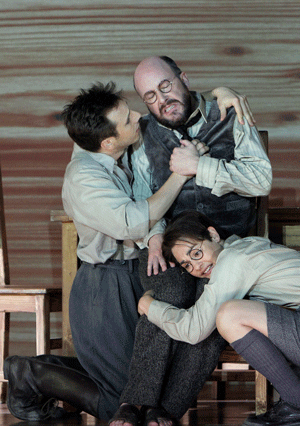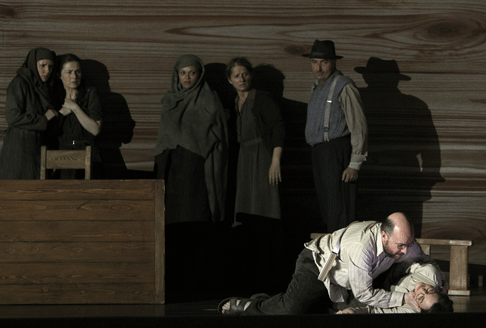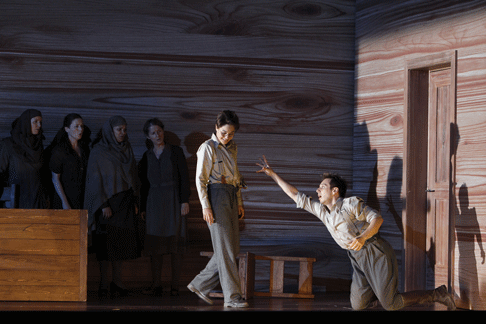
19 Jul 2012
David et Jonathas at the Aix Festival
Rare, very rare repertory that is not even opera stole the show at the sixty fourth Aix Festival.
English Touring Opera are delighted to announce a season of lyric monodramas to tour nationally from October to December. The season features music for solo singer and piano by Argento, Britten, Tippett and Shostakovich with a bold and inventive approach to making opera during social distancing.
This tenth of ten Live from London concerts was in fact a recorded live performance from California. It was no less enjoyable for that, and it was also uplifting to learn that this wasn’t in fact the ‘last’ LfL event that we will be able to enjoy, courtesy of VOCES8 and their fellow vocal ensembles (more below …).
Ever since Wigmore Hall announced their superb series of autumn concerts, all streamed live and available free of charge, I’d been looking forward to this song recital by Ian Bostridge and Imogen Cooper.
The Sixteen continues its exploration of Henry Purcell’s Welcome Songs for Charles II. As with Robert King’s pioneering Purcell series begun over thirty years ago for Hyperion, Harry Christophers is recording two Welcome Songs per disc.
Although Stile Antico’s programme article for their Live from London recital introduced their selection from the many treasures of the English Renaissance in the context of the theological debates and upheavals of the Tudor and Elizabethan years, their performance was more evocative of private chamber music than of public liturgy.
In February this year, Albanian soprano Ermonela Jaho made a highly lauded debut recital at Wigmore Hall - a concert which both celebrated Opera Rara’s 50th anniversary and honoured the career of the Italian soprano Rosina Storchio (1872-1945), the star of verismo who created the title roles in Leoncavallo’s La bohème and Zazà, Mascagni’s Lodoletta and Puccini’s Madama Butterfly.
Evidently, face masks don’t stifle appreciative “Bravo!”s. And, reducing audience numbers doesn’t lower the volume of such acclamations. For, the audience at Wigmore Hall gave soprano Elizabeth Llewellyn and pianist Simon Lepper a greatly deserved warm reception and hearty response following this lunchtime recital of late-Romantic song.
Collapsology. Or, perhaps we should use the French word ‘Collapsologie’ because this is a transdisciplinary idea pretty much advocated by a series of French theorists - and apparently, mostly French theorists. It in essence focuses on the imminent collapse of modern society and all its layers - a series of escalating crises on a global scale: environmental, economic, geopolitical, governmental; the list is extensive.
For this week’s Live from London vocal recital we moved from the home of VOCES8, St Anne and St Agnes in the City of London, to Kings Place, where The Sixteen - who have been associate artists at the venue for some time - presented a programme of music and words bound together by the theme of ‘reflection’.
'Such is your divine Disposation that both you excellently understand, and royally entertaine the Exercise of Musicke.’
Amongst an avalanche of new Mahler recordings appearing at the moment (Das Lied von der Erde seems to be the most favoured, with three) this 1991 Mahler Second from the 2nd Kassel MahlerFest is one of the more interesting releases.
‘And there was war in heaven: Michael and his angels fought against the dragon; and the dragon fought and his angels, And prevailed not; neither was their place found any more in heaven … that old serpent … Satan, which deceiveth the whole world: he was cast out into the earth, and his angels were cast out with him.’
If there is one myth, it seems believed by some people today, that probably needs shattering it is that post-war recordings or performances of Wagner operas were always of exceptional quality. This 1949 Hamburg Tristan und Isolde is one of those recordings - though quite who is to blame for its many problems takes quite some unearthing.
There was never any doubt that the fifth of the twelve Met Stars Live in Concert broadcasts was going to be a palpably intense and vivid event, as well as a musically stunning and theatrically enervating experience.
‘Love’ was the theme for this Live from London performance by Apollo5. Given the complexity and diversity of that human emotion, and Apollo5’s reputation for versatility and diverse repertoire, ranging from Renaissance choral music to jazz, from contemporary classical works to popular song, it was no surprise that their programme spanned 500 years and several musical styles.
The Academy of St Martin in the Fields have titled their autumn series of eight concerts - which are taking place at 5pm and 7.30pm on two Saturdays each month at their home venue in Trafalgar Square, and being filmed for streaming the following Thursday - ‘re:connect’.
The London Symphony Orchestra opened their Autumn 2020 season with a homage to Oliver Knussen, who died at the age of 66 in July 2018. The programme traced a national musical lineage through the twentieth century, from Britten to Knussen, on to Mark-Anthony Turnage, and entwining the LSO and Rattle too.
With the Live from London digital vocal festival entering the second half of the series, the festival’s host, VOCES8, returned to their home at St Annes and St Agnes in the City of London to present a sequence of ‘Choral Dances’ - vocal music inspired by dance, embracing diverse genres from the Renaissance madrigal to swing jazz.
Just a few unison string wriggles from the opening of Mozart’s overture to Le nozze di Figaro are enough to make any opera-lover perch on the edge of their seat, in excited anticipation of the drama in music to come, so there could be no other curtain-raiser for this Gala Concert at the Royal Opera House, the latest instalment from ‘their House’ to ‘our houses’.
"Before the ending of the day, creator of all things, we pray that, with your accustomed mercy, you may watch over us."

Rare, very rare repertory that is not even opera stole the show at the sixty fourth Aix Festival.
It was an oratorio, David et Jonathas, by Marc-Antoine Charpentier who created between the acts tableaux for Molière comedies before Louis XIV banned frivolous entertainments, like plays and opera. Thus theater, never to be suppressed, moved to the concert hall where bible stories were told. That they were really operas anyway was a secret no one told.
David et Jonathas is about two boys who love each other passionately (that’s the David of the Goliath story by the way, and Jonathas, son of Saul) . And yes, there was a prolonged kiss in the Aix staging by Andreas Homoki, lately intendant of Berlin’s Komishe Oper, coming in as that of Zurich Opera. William Christie and his Les Arts Florisants orchestra were in the pit, about forty musicians, including 24 strings to provide a big, lush sound and winds and percussion to add seemingly infinite colors. The wind roll and thunder sheet, both exceptionally well played, made the case for the virtuosity of this famed early music ensemble.
In concert with all this fire power were its three principal singers, Pascal Charboneau as David, Ana Quintans as Jonathas and Neal Davies as Saul, who delivered the maximum rapture, agony and rage that any drama of the Baroque could possibly conjure. There can be no way to hear how this music sounded long ago, but the suspicion lurks that three centuries of operatic progress have layered bel canto, verismo and expressionism onto what singing once was. These singers gave us all of this.

In these voices the usual vocal technique of floating a tone on a column of air gave way (it seemed) to singing on the chords (the vocal chords), like shouting (or screaming) where the vocal urgency is apparent. Of course exercised by these artists it was singing at its most dramatic. And seventeenth century Catholic priest librettist Père François de Paule Bretonneau gave Charpentier’s singers a lot to sing about.
In the Homoki staging David, an outcast of both the Jews and the Philistines, has been taken into the bosom of Saul’s household, the en famille dinner table. The silent mother, first portrayed by an actress and later brilliantly sung by identically costumed counter-tenor Dominique Visse provides the love, Saul is consumed by suspicions, obsessed that David is a powerful rival. Homoki introduced the innocence and intensity of the David/Jonathas relationship in the overture with two young boys happily playing in Saul’s home. These young boys, wonderful actors, later in the opera may have sung a brief duet as their lips moved though no sound was apparent.
Homoki gently and succinctly portrays the crisis in Saul’s mind and kingdom (Saul’s family) by pantomiming the death of the mother. But the mother transformed into the witch Pythonisse, now Mr. Visse, who appears to torment Saul in a lengthy scene where her presence is inexorably intensified by ten (or so) identical mothers. Mr. Visse rendered this scene otherworldly in an operatic voice that is feminine but is not. It was the voice of a witch.

Young Canadian tenor Pascal Charboneau as David compelled us to suffer the death of Jonathas, his love, to be trapped in his complex feelings for his surrogate father and sworn enemy Saul and to understand his emotional desolation at his coronation as the bible’s King David. Mr. Charboneau is a dynamic performer who has yet to gain final finish though this roughness added to his performance. Portuguese soprano Ana Quintans as Jonathas made time stand still in her lament that she (Jonathas) must forsake her love for David, the eternal nature of such love expressed in suspended tones floating above the staff. Mlle. Quintans is a quite polished singer and actress. English baritone Neal Davies made Saul both a conflicted, more or less contemporary Orthodox Jew pater familias and a conflicted political leader. Stabbed by David he lay seemingly dead through an extensive scene until resurrected by rage he made a final, extensive, spine tingling, vocally splendid lunge at David to avenge the death of his son.
Mr. Homoki with his designer, architect Paul Zoller played on the concert genesis of the opera by constructing a huge wooden box, like a concert stage. It was however a sentient machine that expanded and contracted in concert with the drama and its music, its side walls moving in to crush Saul as he learns that God has forsaken him. Its walls again move in to crush Jonathas when he must decide if he will forsake his duty to his father for the sake of his love for David. The costumes by Gideon Davey were brilliantly simple, a timeless modern adaptation of Orthodox dress and an adaptation of the Arabic thwab.
Not to forget to extol the exemplary performance by Les Arts Florisants chorus, both individual voices in solo lines and the scenes with full chorus. Not only did this fine ensemble find the urgency and excitement of opposing populations in its vocal projection, its members physically embodied the action in stance and movement. It was an opera chorus performance of stellar accomplishment.
Michael Milenski